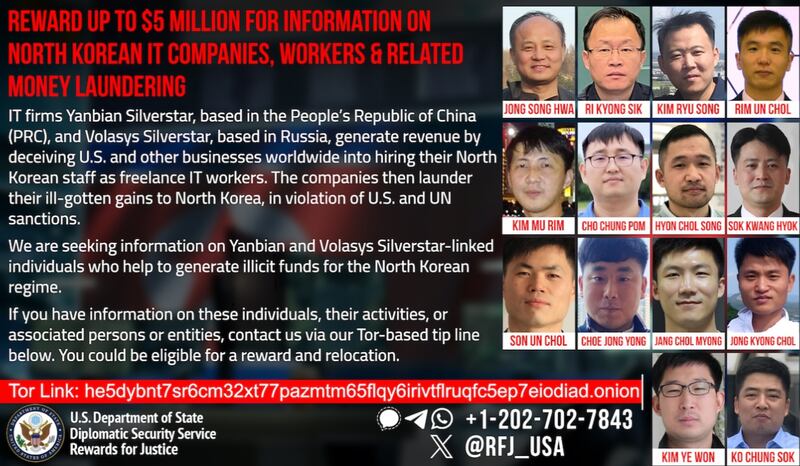TAIPEI, Taiwan – The United States announced rewards of up to US$5 million for information on two North Korean information technology firms, saying they orchestrated a scheme to put North Korean workers in U.S. companies to extort money to fund the development of weapons.
About 130 North Korean workers got IT jobs at unsuspecting U.S. firms and nonprofits from 2017 to 2023 and generated at least US$88 million in “ill-gotten gains” that Pyongyang used for its weapons of mass destruction programs, according to the U.S. State Department.
The State Department said it sought a tip on Yanbian Silverstar Network Technology Co., Ltd. in China and Volasys Silverstar in Russia, adding that they handled the workers.
It also made public the names of 14 people, including Jong Song Hwa, the CEO of both companies, and Yanbian Silverstar President Kim Ryu Song and Volasys Silverstar President Ri Kyong Sik.
“These IT firms engaged in the exportation of North Korean IT workers, managers, and support staff to Yanji in China’s Jilin Province and Vladivostok, Russia to generate revenue by deceiving U.S. and other businesses worldwide into hiring them as freelance IT workers,” the department said in a press release on Thursday.
“The companies then laundered their ill-gotten gains to benefit the DPRK,” it added, referring to North Korea by its official name, the Democratic People’s Republic of Korea.
The 14 individuals and unnamed associates used the stolen, borrowed and purchased identities of hundreds of U.S. people to conceal their identities, said the department.
They also secured remote employment as IT workers with U.S. businesses and organizations by applying under false pretenses and registering internet domain names to create websites that misled U.S. employers into believing the applicants had affiliations with reputable U.S. companies, according to the department.
Additionally, they collaborated with U.S. individuals to acquire laptops – either by purchasing them or receiving them from U.S. employers – and then installed remote access software on them to extort payments from the employers by threatening to expose sensitive information online.

The bounty was offered as part of the “Rewards for Justice” program, which is designed to “generate useful information that protects Americans and furthers U.S. national security.”
“The program offers rewards for information on terrorism, foreign-linked interference in U.S. elections, foreign-directed malicious cyber activities against the United States, and the financial mechanisms of individuals engaged in certain activities to support the North Korean regime,” the program’s official website reads.
North Korea had not responded to the announcement by the time of this publication.
In July, the State Department announced a reward of up to US$10 million for information on Rim Jong Hyok, a North Korean cyber actor targeting America’s critical infrastructure.
In May, it offered a reward of up to US$5 million for information on three North Korean IT workers and their manager who were engaged in a scheme enabling the workers to get illicit remote employment with false identities belonging to U.S. citizens.
State sponsor of terrorism
The department also kept North Korea on its list of state sponsors of terrorism, saying it repeatedly supported acts of international terrorism.
“The Secretary of State determined that the DPRK government repeatedly provided support for acts of international terrorism, as the DPRK was implicated in assassinations on foreign soil,” said the department in the 2023 Country Reports on Terrorism on Thursday.
The country reports feature a list of state terrorism sponsors, which includes Cuba, Iran and Syria. North Korea has been on the list since November 2017.
The designation triggers sanctions, including bans on arms exports, stricter export controls, restrictions on U.S. aid and visas and other financial penalties.
The North was first listed as a state sponsor of terrorism in 1988 for its involvement in the 1987 bombing of a Korean Air passenger flight, but its designation was rescinded in 2008 after a legal review.
“In 2017 the Secretary of State determined the DPRK had repeatedly provided support for acts of international terrorism in the nine years since its designation had been rescinded,” the department said.
“The nation also has failed to take action to address historical support for acts of international terrorism.”
RELATED STORIES
US aims to deter China, North Korea with new space force unit in Japan
US arrests man allegedly helping North Korea prepare ‘surprise attack’ on South
North Korea’s Kim plays down prospect of better US ties under Trump
The department’s announcement came as U.S. President-elect Donald Trump highlighted his personal ties with North Korean leader Kim Jong Un in an interview with Time magazine.
“I know Kim Jong Un, I get along very well with Kim Jong Un … When you think about it, I am the only one he’s ever dealt with,” said Trump in the interview with the magazine that chose him as its 2024 Person of the Year.
Trump spearheaded an unprecedented diplomatic push on North Korea during his first term as president in an effort to get it to abandon its nuclear and missile programs.
He met Kim three times and became the first U.S. president to set foot on North Korean territory but the effort brought no tangible progress on denuclearization or any lasting improvement in relations.
It is not clear if Pyongyang would respond to any new diplomatic overtures from Washington, given its growing military ties with Moscow.
Last month, Kim appeared to rule out the prospect of improving relations with the U.S., saying negotiations in the past had only confirmed unwavering U.S. hostility.
Edited by RFA Staff.
